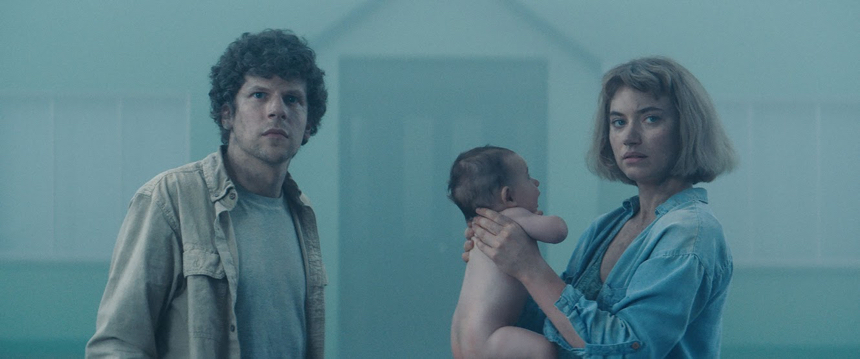Fantasia 2019 Review: VIVARIUM Is An Abstract Suburban Gothic

“The strawberries have no taste.” This might be my favourite line of dialogue from this high-concept science fiction satire, an Irish-Danish-Belgian co-production that has a go at the American dream. For decades now, the gargantuan frankenberries are picked and shipped shipped from California or Florida. They ripen along the way, via chemicals, to arrive, just in time, in clear plastic rectangles to supermarkets around the world - at a cost cheaper than locally grown berries. We know we want cheap always available strawberries. But at what cost? What we end up getting is a simulacrum of an actual strawberry with the texture of rubber and the taste of slightly flavoured water.
Some scientists, and certain eccentric Tech-Billionaires, have recently been revisiting the centuries old theory that there is a significant chance that we are living in a simulation put on by another, more advanced civilization. I believe it goes all the back to Descartes who might of relaxed with a bit of bud, somewhere between the French philosopher inventing Cartesian coordinates and Calculus. Vivarium takes this theory, and blows it up to feature film length, with the addition of a horrific twist. What if our existence was a really fucking horrible simulation, a mockery of something we knew? And in the suburbs to boot.
Enter Gemma (Imogen Poots) and Tom (Jesse Eisenberg), a cute couple in a stable relationship. She is a school teacher, he a landscaper that does the grounds of her school. Both are ready to take the plunge into buying a house together, and possibly raising a family. That is, until they meet the creepiest real-estate agent in the history of cinema, Martin. Martin is so out of this world, that Gemma and Tom agree to a showing of one of his cookie cutter units for sale, more to play out the bad joke of his sales pitch and model home, than that they seriously want buy into this life.
When they arrive in Yonder - “not too far from the city, but not too near the city” - to see endless spaghetti streets, packed tight with a single repeating unit of detached house. The joke is on them. Martin abandons them to the empty, cartoonish development, and they cannot find their way out. Not because the the streets are confusing and circular, but because there is no way out: The houses stretch beyond the horizon in all directions. They are all identical, and they are all empty. From ubiquitous overhead shots directly above, they look a computer rendering, this is probably not by accident.
Soon, packages of plastic wrapped prepared food are mysteriously delivered by an unseen vehicle (a terrifying possible end-point of Amazon Prime). A live baby arrives in the same fashion, with the instructions, “Raise the child and be released.” The child is a freaky kind of ‘Sunday’s best’ dressed, clean cut, robot that screams when dinner isn’t on the table and watches an endless black and white fractal program on the television. He begins to copy and repeat the mannerisms and stressed out fights that his parents play out in their caged predicament. Vivarium proceeds in earnest to examine the entire life-cycle of the post WWII ‘middle class dream’ with a dry kind of savagery, and a diorama visual sense that recalls Swedish auteur Roy Andersson.
Like a good Twilight Zone episode,Tom and Gemma are cursed with the knowledge of the real world is like, making things much, much worse. They rebel against the prisonin which they find themselves. Eisenberg drops his usual fussy, self-reflexive mannerisms, and makes for a convincing straight and narrow father figure, one who works with his hands. At one point Tom attempts to literally dig his way out of his trapped existence, the root word of mortgage is death. His is a bit of a single tone character, but nevertheless it is a refreshing change for the actor to play a sort of everyman.
The movie belongs to Imogen Poots, who, in spite of how awful and unfathomable the child is (they never name it), finds herself grudgingly forming a maternal bond that wavers between a tentative, caring curiosity and exasperated hate. She sets the tone of the household and family dynamic, and really the film. She is harried and human and barely holding things together, living out a mockery of her vague domestic dream.
Poots' sweaty near-panic does the heavy lifting to contrast the static, single set lego-subdivision, with its perfect blue sky, and clouds that are only in the ‘perfect’ shape of clouds. The rebellion of Gemma and Tom against their prison, their scream into the void, remains over the (inevitable) course of the film, but becomes muted with routine and repetition. The homes in Yonder are not 'starter' homes, but ‘forever’ homes. The film suffers a bit in this regard, but does not outstay its welcome.
You can unpack all the metaphors that writer Garret Shanely and director Lorcan Finnegan poke and prod in their uncanny little sandbox. There are many, but I the one that pleases me most is the wind: There is no wind, not even a breeze, in Yonder. What is living if you cannot stop and feel the wind?
Vivarium
Director(s)
- Lorcan Finnegan
Writer(s)
- Lorcan Finnegan (story by)
- Garret Shanley (story by)
- Garret Shanley
Cast
- Jesse Eisenberg
- Imogen Poots
- Jonathan Aris
- Eanna Hardwicke

Do you feel this content is inappropriate or infringes upon your rights? Click here to report it, or see our DMCA policy.






